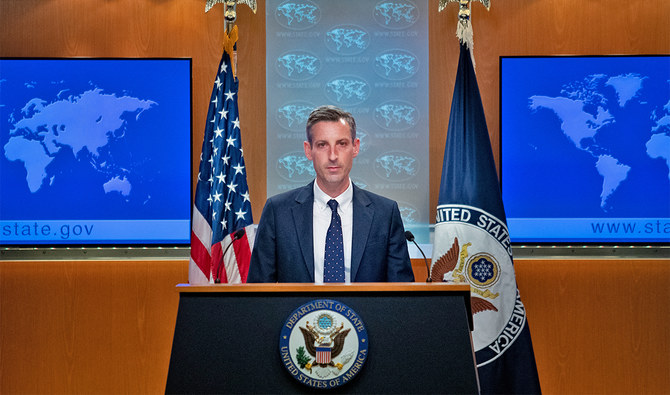ISLAMABAD: US State Department Spokesperson Ned Price has said “now is not the time” to bolster economic ties with Russia, as Moscow plans to start exporting oil to energy-starved Pakistan after March if terms are agreed.
Last week, Pakistani officials and Russian Energy Minister Nikolay Shulginov, who was in Islamabad for an annual inter-governmental commission on trade and economy, said key elements of an energy deal had yet to be agreed but the two sides had “conceptually” decided to sign an agreement that would determine and resolve all issues of logistics, insurance, payment and volumes.
Historically Pakistan has had no major commercial relations with Moscow, unlike neighboring India, and as a traditional US ally, it had also been hesitant to do trade or any business with Moscow in the past.
It currently depends on oil from Gulf countries, which often extend facilities such as deferred payments and can supply with lower transport costs, given Pakistan’s relative proximity.
“We have been very clear that now is not the time to increase economic activity with Russia,” Price said on Tuesday night in response to a question about Islamabad buying oil products from Moscow.
“But we understand the imperative of keeping global energy markets well resourced, well supplied, and the price cap, we believe, provides a mechanism to do that.”
The G7 economies, the European Union and Australia agreed to a $60-per-barrel price cap on Russian seaborne crude oil effective from Dec. 5 over Moscow’s “special military operation” in Ukraine.
“Our approach to this is [Islamabad-Moscow deal] – has been laid out in the price cap mechanism that we worked out with other countries around the world, including the G7,” Price said.
“And the virtue of the price cap is that it allows energy markets to continue to be resourced while depriving Moscow of the revenue it would need to continue to propagate and fuel its brutal war against Ukraine.”
“We have made the point that we have very intentionally not sanctioned Russian oil. Instead, it’s now subject to the price cap. So we have encouraged countries to take advantage of that, even those countries that have not formally signed on to the price cap, so that they can acquire oil in some cases at a steep discount from what they would otherwise acquire from, in this case, Russia.”
Pakistan has not specified the price of the oil it will get from Russia or said whether the imports would comply with the $60 per barrel cap. Moscow has said it will not sell to countries that comply with the cap.
Pakistan has been unable to procure LNG from the international market because spot prices remain out of its range and shipments under long-term deals remain insufficient to match rising demand.
With dwindling local gas reserves, the country has begun to ration supplies to residential and commercial consumers. Local media has also reported that oil supplies remain tenuous owing to difficulties in paying for imports.
Oil and energy make up the largest portion of Pakistan’s imports bill.


















